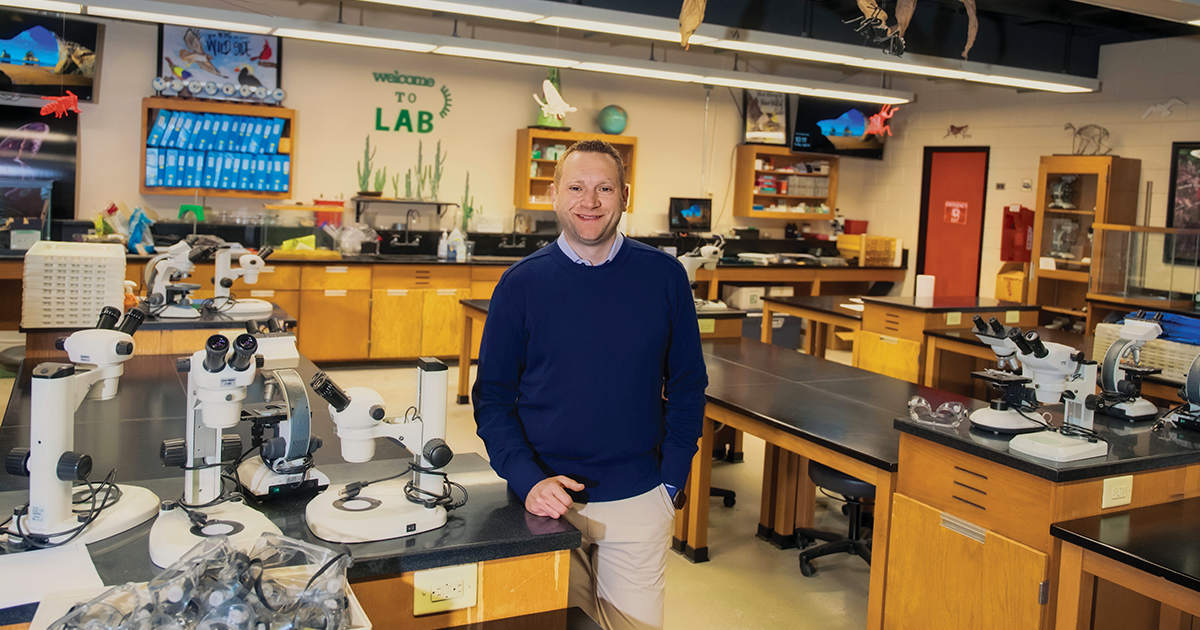
5 minute read
On the Frontlines of Neuroscience
By AMY CHARLES, MBA ’23
Elkhorn City, Ky., native Chris Walker, Ph.D., ’18 has emerged as a rising researcher in addiction science, tracing his academic roots back to the University of Pikeville. With a bachelor’s degree in biology and a minor in chemistry, Walker laid the groundwork for a career focused on understanding how substance use shapes long-term brain function.
Now a postdoctoral fellow at the Medical University of South Carolina (MUSC), Walker has progressed from his graduate work studying adolescent addiction to research centered on how adult alcohol consumption affects the brain.
“Currently, my work focuses on understanding how discrete changes in neuronal cell populations across the brain that are engaged upon the initiation of alcohol consumption contribute to longterm excessive drinking,” said Walker. “We’re working to understand the biological mechanisms that underlie addiction vulnerability and recovery, with the ultimate goal of informing early intervention strategies.”
Walker’s interest in this field is influenced by his upbringing in Eastern Kentucky, where he witnessed firsthand how addiction devastated individuals and families in his community. Motivated by the loss of friends and classmates, he turned his academic focus toward the neuroscience of addiction.
A pivotal point in Walker’s journey came during his doctoral studies at Marshall University, where he earned a Ph.D. in biomedical sciences under the mentorship of Mary-Louise Risher, Ph.D., associate professor at the Joan C. Edwards School of Medicine. He quickly became a standout in her lab.
“Chris rotated in my lab early on in the Ph.D. program, and we just clicked,” said Risher. “He asked good questions, came in with a lot of enthusiasm, and decided he wanted to join the lab immediately. I was thrilled. He was actually my first graduate student at Marshall and was instrumental in getting my lab off the ground.”
During his time there, he was awarded a prestigious fellowship through the West Virginia NASA Space Grant Consortium, an achievement that fueled his research on adolescent binge drinking and its longlasting neurological impacts.
“My graduate work explored how repeated alcohol exposure during adolescence affects synaptic plasticity, particularly in the context of stress,” said Walker. “Applying for the NASA fellowship was a leap of faith, but it paid off. It supported my research and opened doors to collaborations across multiple institutions.”
Walker’s thesis formed the foundation of a larger body of work examining how adolescent binge drinking affects brain function. One of his most impactful contributions during his time at Marshall University was a first-author publication that explored how adolescent binge drinking disrupts communication between brain cells, specifically astrocyte-synaptic coupling. He also co-authored a research review article, helped write a book chapter and made significant contributions to many other projects in the lab.
Although they no longer work side by side, Walker’s legacy in the lab remains strong. Some of the work he began is now being incorporated into a manuscript the team hopes to submit for publication this summer.
“He’s been gone for about two years now, busy learning new techniques and doing great work at MUSC,” said Risher. “We still catch up at conferences, and I hope we’ll collaborate again in the future. I’m proud of him and look forward to seeing where his career takes him.”
Walker credits much of his early success to mentors like Risher who believed in him. Among them is Mathys J. Meyer, Ph.D., now associate vice president of student success and retention at UPIKE, who played a formative role in guiding Walker toward his current career.
“Dr. Meyer has been one of the most influential people in my life. I genuinely wouldn’t be where I am today without his guidance. He believed in me when I didn’t believe in myself, pushed me to pursue my Ph.D., and has never stopped offering support,” said Walker. “Even now, he checks in and encourages me. That kind of mentorship is rare, and I’m incredibly grateful for it.”
Meyer recalls Walker as a driven student who was never content to accept surface-level answers.
“Not only is Chris one of the best students I’ve ever had the privilege to teach, but he’s also a brilliant human being who’s become like family to us. I’m incredibly proud of the work he’s doing. His research is thoughtful, important and exactly the kind of impact I always knew he was capable of making,” said Meyer. “Seeing him thrive in a field he’s so passionate about is no surprise. He’s always had the dedication, empathy and intellect to do something meaningful.”
Walker has returned to UPIKE several times to speak with students about his research and career path. He emphasized the versatility of a science degree and shared how a UPIKE education shaped his future.
In addition to his outreach efforts, he serves on the UPIKE Alumni Board, connecting with other former students to support the next generation of graduates.
I believe in UPIKE’s mission and feel a responsibility to give back. It’s important to keep that cycle of mentorship and support going. I’m proud to be a UPIKE graduate, and I’m optimistic about what’s ahead, not just for my own work, but for the university and its future scientists.










